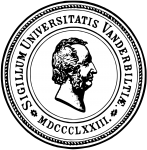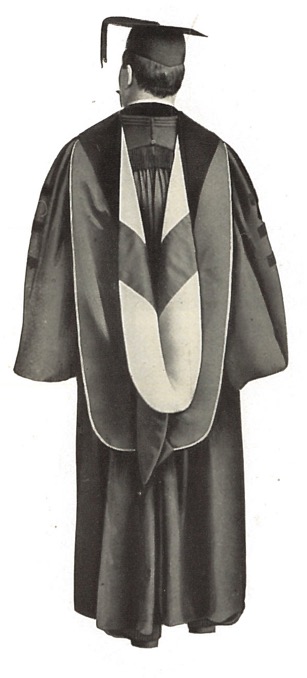Vanderbilt University
Tennessee
1873



Gardner Cotrell Leonard was the Director of the Intercollegiate Bureau of Academic Costume (IBAC) and also a partner at Cotrell & Leonard, one of the major manufacturing firms for academic dress in the United States. Because the relationship between the IBAC and Cotrell & Leonard was tight (contemporary materials described Cotrell & Leonard as the “depository” for the IBAC), it is likely that a school was assigned an academic hood lining pattern by the IBAC when that school made a purchase order for academic costume from Cotrell & Leonard. If this is correct, Cotrell & Leonard advertisements from the turn of the century can provide one with a rough estimation of the date when the hood lining pattern of a particular college or university was first registered by the IBAC.
Vanderbilt was first referenced (without a description of its hood) in a Cotrell & Leonard advertisement in the university’s 1896 Comet yearbook, which suggests an 1896 registry by the IBAC. Vanderbilt was probably assigned a hood lined gold with a black chevron. However, the first full description of the university’s hood lining was not until an IBAC list from 1927, where it was described as “lemon yellow” with a black chevron. Yellow and gold were interchangeable heraldic color descriptions, but here the IBAC appears to have been using lemon yellow as a way to avoid acknowledging that the Bureau had also assigned the same hood to the Medical College of South Carolina. Even so, this IBAC reassignment unfortunately duplicated the hood lining already assigned to Randolph Macon College (lemon yellow with a black chevron).


The first Vanderbilt University football team adopted old gold and black as its colors in 1890, but the original brown-orange shade of old gold quickly lightened to a bright yellow gold. The official colors of the university thus became gold and black.
Citations in the World Almanac (listed by cover date; color information is from the previous year): black/old gold (1895-1899); black/gold (1900-1933); gold/black (1934-)


As a result of this duplication problem, by 1969 the IBAC corrected the lemon yellow lining to Vanderbilt’s official gold, still with a black chevron.
Here what was presumably the original gold and black IBAC assignment has been restored.
One should note that although Vanderbilt students had been wearing academic costume for several years, according to the Vanderbilt University Quarterly Volume 1 Number 1 (March 1901) members of the Vanderbilt administration and faculty weren’t required to wear academic costume until 1900, at the 25th Anniversary celebrations of the opening of the university (21-23 October 1900). It was to be worn for all official occasions thereafter.
Between 2005 and 2014, graduates with a Doctor of Philosophy degree from Vanderbilt were allowed to wear a special gown derived from the style of gown used at Cambridge University. This was replaced by a standard American-style doctoral gown in Vanderbilt’s school colors. This gown, as well as the black doctoral gown for other doctor’s degrees, has the Vanderbilt logo embroidered on the upper part of the velvet facings of the gown.



